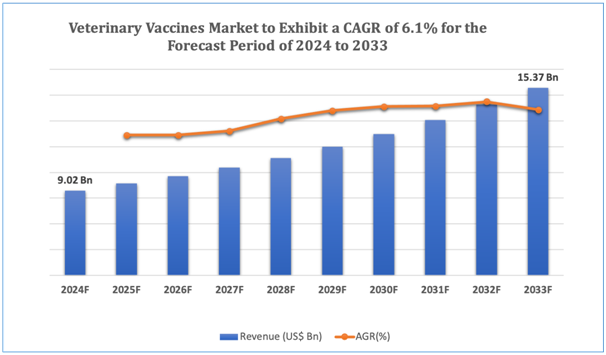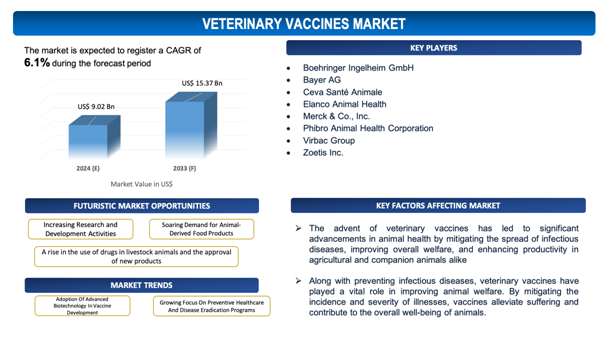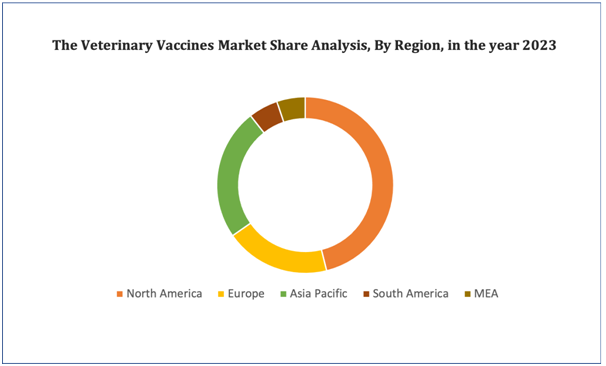Veterinary Vaccines Market Overview
The global Veterinary Vaccines market is estimated to be worth over USD 15.37 Bn in 2033 and is expected to grow at CAGR of 6.1% during the forecast period (2024-2033).
Veterinary vaccines stands as a foundation stone in the prevention and regulation of infectious diseases in animals, transforming the panorama of animal treatment in recent times. These vaccines, corresponding to their human counterparts, encourage the immune system of animals to recognize and battle specific pathogens, in this way reducing the risk of disease transmission and severity. The advent of veterinary vaccines has led to significant advancements in animal health by mitigating the spread of infectious diseases, improving overall welfare, and enhancing productivity in agricultural and companion animals alike.
One of the fundamental benefits of veterinary vaccines is their role in avoiding the outbreak and spread of infectious diseases within animal populations. By immunizing animals against pathogens such as bacteria, viruses, and parasites, vaccines effectively establish a protective barrier, reducing the likelihood of disease transmission. This not only safeguards individual animals but also contributes to the broader goal of public health by mitigating the risk of zoonotic diseases, which can transmit from animals to humans.
Moreover, veterinary vaccines have transformed the approach to disease management, moving away the focus from treatment to prevention. Vaccination programs are now significant components of animal health management strategies, specifically in agricultural settings where disease outbreaks can have substantial economic repercussions. By vaccinating livestock against common pathogens like foot-and-mouth disease, brucellosis, and avian influenza, farmers can protect their herds, enhance productivity, and ensure the safety of food supplies.
Along with preventing infectious diseases, veterinary vaccines have played a vital role in improving animal welfare. By mitigating the incidence and severity of illnesses, vaccines alleviate suffering and contribute to the overall well-being of animals. This is particularly crucial in the case of companion animals, where vaccination against diseases like parvovirus, rabies, and feline leukaemia has become standard practice, stretching both the quality and duration of their lives.
All in all, veterinary vaccines illustrates a revolutionary force in the treatment panorama of animals in current times. Through their capability to avoid disease, safeguard public health, improve productivity, and support animal welfare, vaccines have become powerful tools in ensuring the health and well-being of animals across the world.
Figure 1. Veterinary Vaccines: Market Size

Get more details on this report - Request Free Sample
Key Market Insights &Current Market Landscape
The global veterinary vaccines market is experiencing steady growth, driven by increasing awareness of animal health, rising pet ownership, and the need to combat infectious diseases in livestock. Major developments and novel technologies have reshaped the market landscape, with a focus on enhancing vaccine efficacy, safety, and delivery methods. One notable trend is the development of next-generation vaccines using recombinant DNA technology, which allows the production of safer and more targeted vaccines.These vaccines provideenhanced efficacy and minimized risk of adverse reactions in contrast toconventional attenuated or inactivated vaccines.
Alongside, the advent of novel adjuvants and delivery systems has transformed vaccine development, enabling for greater immune response and extended protection. Nanoparticle-based vaccines, for instance, offer improved stability and targeted antigen delivery, leading to more robust immune responses. Additionally, advancements in vaccine formulation have led to the development of combination vaccines, which provide protection against multiple pathogens in a single injection, streamlining vaccination protocols and reducing the need for multiple doses.
In reprisal for the growing demand for personalized healthcare, there has been a surge in the development of companion animal vaccines customized to specific breeds or genetic susceptibilities. These vaccines address individualized health needs, indicating a switch towards precision medicine in veterinary care.
Moreover, the increasing prevalence of zoonotic diseases and the need to prevent disease transmission from animals to humans have driven innovation in vaccine development for food-producing animals. Vaccines targeting pathogens such as Salmonella, E. coli, and avian influenza not only protect animal health but also contribute to food safety and public health.
Overall, the global veterinary vaccines market continues to evolve swiftly, propelled by advancements in biotechnology, increased investment in research and development, and growing demand for effective disease prevention strategies. As stakeholders continue to prioritize biosecurity, animal welfare, and public health, the veterinary vaccines market is poised for further expansion and innovation in the forthcoming years.
Market Dynamics
Market Drivers
Soaring Demand for Animal-Derived Food Products
The increasing demand for animal-derived food products notablyfuels the global veterinary vaccines market. Since global populations soar and incomes rise, specifically in developing countries, there is a growing preference for high-protein diets, eminently featuring dairy, meat, and eggs. This soar in demand requires the expansion of livestock farming, which, on that account, escalates the need for effective disease prevention strategies to administer animal health and productivity. Veterinary vaccines hold a critical role in avoiding infectious diseases that can eradicate livestock populations, ensuring safe and consistent food supply chains. In addition, healthy livestock contributes to improved meat quality, greater yield, and reduced production costs, which are crucial for fulfilling the escalating market demands efficiently. Governments and regulatory bodies across the world also facilitate the vaccination of animals to avoid zoonotic diseases, which can transmit from animals to humans, presenting public health risks. As a consequence, the elevating consumption of animal-derived products immediatelyassociates with higher investments in veterinary healthcare and vaccines, accelerating market growth as producers strive to secure their herds and flocks from potential outbreaks. This correlationhighlights the vital role of veterinary vaccines in sustaining the agricultural economy and food security worldwide.
Market Restraints
With regard to numerous advantages of Veterinary Vaccines, the market faces several challenges due to the unique characteristics and requirements associated with these potent pharmaceutical products. Some of the key market challenges include:
- High Costs of Vaccine Development and Production: The development and production of veterinary vaccines are costly and time-consuming processes, often requiring extensive research, meticulous testing, and regulatory approvals. These increased costs can impede small and medium-sized enterprises from entering the market and confine the affordability and accessibility of vaccines, particularly in developing regions.
- Stringent Regulatory Frameworks: The global veterinary vaccines market is subject to stringent regulatory frameworks that govern the approval, distribution, and use of vaccines. These regulations, while required to ensure efficacyand safety, can result in lengthy approval processes and compliance challenges, potentially postponing the introduction of new vaccines to the market and increasing operational costs for manufacturers.

Get more details on this report - Request Free Sample
Market Opportunity
Increasing Research and Development Activities
As the demand for advanced and effective veterinary healthcare solutions surges, there is an intensified focus on R&D to innovate and develop novel vaccines that address a wider range of diseases and improve upon existing formulations. Improved R&D efforts result in the discovery of novel antigens and adjuvants, enhancing vaccine efficiency and safety profiles. This advancement not only fulfils the growing demand for improved disease prevention but also opens up new market segments, including vaccines for emerging diseases and specialized applications such as companion animal health and aquaculture.
In addition to that, breakthroughs in biotechnology and genetic engineering are leading the way for the development of next-generation vaccines, such as recombinant and DNA vaccines, which provide more accurate and long-lasting immunity. These leading-edge solutions appeal investment from both public and private sectors, further accelerating the growth of the market. Collaboration between government bodies, academic institutions, and pharmaceutical companies fosters a strong R&D ecosystem, supporting the swift translation of scientific discoveries into market-ready products.
Furthermore, growing R&D activities improve the knowledge of animal health and disease mechanisms, paving its way to more targeted and effective vaccination strategies. This not only ensures better health outcomes for livestock and companion animals but also propels the productivity and profitability of the animal husbandry sector. Therefore, the ongoing investment in R&D is fuelling the evolution and expansion of the veterinary vaccines market, offeringlucrative opportunities for market players to capitalize on the soaring need for advanced veterinary healthcare solutions.
Market Trends
- Adoption of Advanced Biotechnology in Vaccine Development: The veterinary vaccines market is experiencing a trend towards the adoption of advanced biotechnology methods, such as gene editing, recombinant DNA technology, and synthetic biology. These technologies allow the development of more accurate and effective vaccines, comprising subunit, vector-based, and nucleic acid vaccines, which provideenhanced safety profiles and stronger immune responses. This trend is propelling the production of next-generation vaccines that can target specific pathogens more effectively and provide longer-lasting immunity.
- Growing Focus on Preventive Healthcare and Disease Eradication Programs: There is a surging focus on preventive healthcare and large-scale disease eradication programs, fuelled by both governmental and non-governmental organizations. Initiatives emphasized at controlling and eradicating diseases like rabies, foot-and-mouth disease, and avian influenza are gaining traction. This trend is resulting inincreased vaccination rates and the implementation of mass vaccination campaigns, which in turn is propelling demand for veterinary vaccines. In addition, awareness campaigns and education on the prominence of animal vaccination are fostering a proactive approach to animal health, aiding to the market's growth.
Veterinary Vaccines Market: Key Segments
By Product
- Attenuated Live Vaccines
- Conjugate Vaccines
- Inactivated Vaccines
- Subunit Vaccines
- Toxoid Vaccines
- DNA Vaccines
- Recombinant Vaccines
By Disease
- Anaplasmosis
- Canine Parvovirus
- Foot & Mouth Disease
- New Castle Disease
- Distemper Disease
- Influenza
- Porcine Reproductive & Respiratory Syndrome (PRRS)
- Others
By Distribution Channel
- Veterinary Clinics
- Veterinary Hospitals
- Veterinary Research Institutes
- Retail Pharmacies
By Species
- Companion Animals
- Canine
- Avian
- Feline
- Livestock Animals
- Aquatic
- Bovine
- Porcine
- Ovine/Caprine
- Poultry
- Equine
By Key Geographical Regions
- North America
- Europe
- Asia-Pacific
- Middle East and Africa
- South America
Veterinary Vaccines Market: Segmental Analysis
On the basis of product, the global veterinary vaccinesmarket is segmented into Attenuated Live Vaccines, Conjugate Vaccines, Inactivated Vaccines, Subunit Vaccines, Toxoid Vaccines, DNA Vaccines, Recombinant Vaccines. Attenuated live vaccines are the most preferred in the global veterinary vaccines market owing to their ability to induce strong and long-lasting immune responses by imitating natural infections. These vaccines typically require fewer doses and offer broader immunity compared to other kinds. Their efficacy in stimulating both cellular and humoral immunity makes them particularly effective in preventing a broader range of infectious diseases in animals, adding to their substantial market share.
On the basis of species, the market is segmented into companion animals, livestock animals, and equine. Livestock animals account for the dominant share of the global veterinary vaccines market due to the critical importance of maintaining herd health for food production. Effective vaccination programs help prevent disease outbreaks, ensuring the safety and productivity of meat, dairy, and egg supply chains. The economic impact of healthy livestock is substantial, driving high demand for vaccines to protect against common infectious diseases, thereby sustaining the agricultural economy and food security.
Figure 4. Veterinary Vaccines Market: Distribution by Region

Get more details on this report - Request Free Sample
Veterinary Vaccines Market: Regional Analysis
North America continues to shape revenue generation in the global veterinary vaccines market owing to an upsurge in the usage of efficacious pet vaccines in tandem with tech-advanced vaccine delivery equipment, a surge in pet adoption rates, and swift expansion of the animal vaccines market.Asia-Pacific is anticipated to dominate the market in the forecast period attributing the increasing livestock population in this region. The rise in the livestock population and government initiatives, specifically in emerging economies, are some of the major factors estimated to surge the market growth in the region.
Leading Veterinary Vaccines Developers
Industry Trends and Global Forecasts, 2023-2035 report features an extensive study of the current market landscape, market size and future opportunities associated with the Veterinary Vaccines market, during the given forecast period. Further, the market report highlights the efforts of several stakeholders engaged in this rapidly emerging segment of the biopharmaceutical industry. Key takeaways of the Veterinary Vaccines market are briefly discussed below.
The report includes the list of players operating in the global veterinary vaccinesmarket. Some of the key players include:
- Boehringer Ingelheim GmbH
- Bayer AG
- CevaSantéAnimale
- Elanco Animal Health
- Merck & Co., Inc.
- Phibro Animal Health Corporation
- Virbac Group
- Zoetis Inc.
Scope of the Report
The market report presents an in-depth analysis of the various firms / organizations that are engaged in this market, across different segments, as defined in the below table:
|
Key Report Attributes |
Details |
|
Base Year |
2023 |
|
Forecast Period |
2024-2033 |
|
CAGR (2024-2033) |
6.1% |
|
Product |
|
|
Disease |
|
|
Distribution Channel |
|
|
Species |
|
|
Key Geographical Regions |
|
|
Key Companies Profiled |
|
